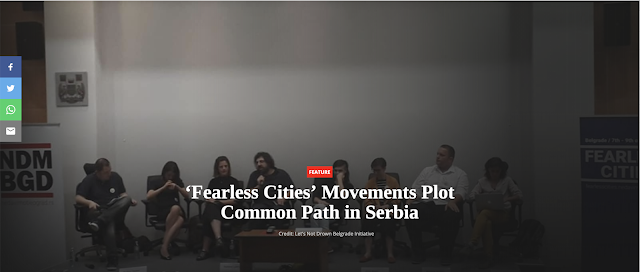'Fearless Cities' Movements Plot Common Path in Serbia
‘Municipalist’ movements from all over Europe met in the Serbian capital last weekend to exchange ideas and plan a common strategy against deeply entrenched political structures in their home countries.
“It is a good opportunity to see how both smaller and bigger European cities are doing, and how we are actually on the same page for how we want to introduce citizens to decision-making,” Radomir Lazovic, one of the founders of Ne Davimo Beograd, said.
“We are against the privatization and commercialisation of public assets, and we want to develop cities that belong to us, as citizens,” he told BIRN.
Besides opposing the Belgrade Waterfront, Ne Davimo Beograd has supported months of protests in the Serbian capital against the government of President Aleksandar Vucic.
The “1of 5 million” movement launched a series of protests on December 8 last year, demanding that Vucic and his governing Serbian Progressive Party resign, as well as more media freedom and fair elections.
At the event in Belgrade, one of the panels gathered individuals from all over the Balkans, including North Macedonia, Albania and Croatia, to discuss the rise of local movements in their respective countries, and whether these movements actually have the potential to affect real change.
Many panelists emphasized that in their home cities, members of the public often didn’t even know that they had neighbourhood councils and could have a real say in matters affecting their cities and towns.
“Connecting and expanding our knowledge on the practices we are interested in is important, especially at a time when we see that right-wing formations and political parties are much better organized, much better mobilized and much more present in the general media with a higher impact on the general public,” said Ivana Dragsic, from the Skopje-based organization, Freedom Square.
How municipalist movements can help shape the future of European politics was the main topic of discussion in Belgrade.
“Municipalism” emphasises the importance of allowing cities and towns to make their own decisions on issues like affordable housing, sustainable environmental policies and transparency.
This article was originally published in Balkan Insight.




Comments